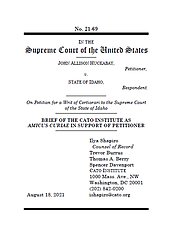On appeal, the Idaho Court of Appeals overturned the conviction, finding that Idaho law required possession of more than one animal to constitute a felony. The state petitioned the Idaho Supreme Court for review, which reversed the court of appeals and affirmed Huckabay’s conviction. In its decision, the court declined to take up the question whether due process requires mens rea (a guilty mind) for a felony conviction.
Huckabay has filed a petition with the Supreme Court arguing that, because the state never showed that he knew he unlawfully possessed the moose, his conviction violates the Fourteenth Amendment’s Due Process Clause. Huckabay is asking the Court to require a mens rea element for felonies that are not public-welfare offenses.
Cato has filed an amicus brief in support of Huckabay’s petition, advising the Court to use the case to return to the Founders’ understanding of no felony criminal culpability without criminal intent. Our brief details the deep tradition of requiring a guilty mind for felony criminal convictions—from the common law through the 19th century.
While courts in the 20th century allowed strict liability crimes (meaning crimes without a mens rea requirement), they were restricted to public-welfare offenses, which are usually not serious in nature and carry small penalties. Courts cited the small penalties and the need to protect the public as justification for strict liability crimes.
But Idaho went well beyond the normal boundaries of public-welfare offenses in imposing a felony for a strict liability offense. A felony conviction comes with serious penalties and gravely besmirches the character of those convicted. Moreover, unlawful possession of a moose is not the sort of public-welfare offense that earlier courts allowed.
Though Huckabay’s case is unusual, it reflects a growing trend of states implementing strict liability felony crimes. We urge the Court to stop this growing trend and require criminal intent to sustain felony criminal liability.




